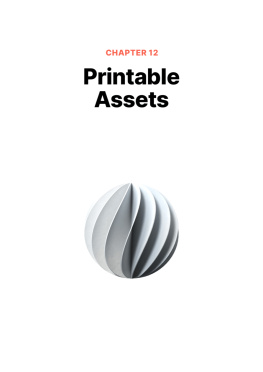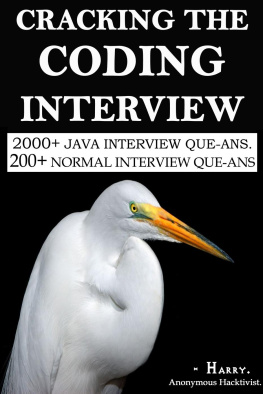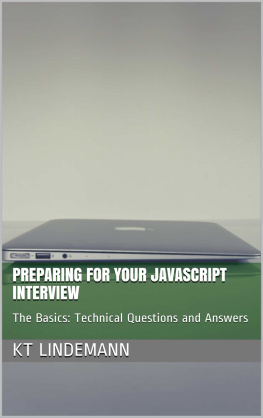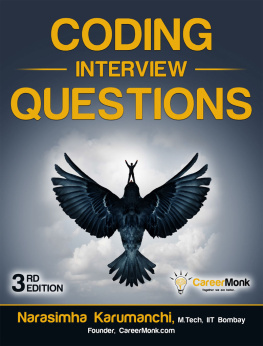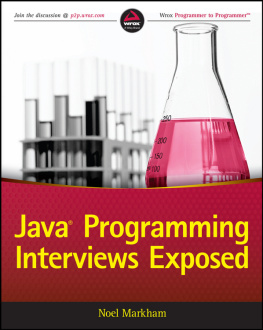Emma Bostian - De-Coding the Technical Interview Process
Here you can read online Emma Bostian - De-Coding the Technical Interview Process full text of the book (entire story) in english for free. Download pdf and epub, get meaning, cover and reviews about this ebook. year: 2021, publisher: egghead.io, genre: Home and family. Description of the work, (preface) as well as reviews are available. Best literature library LitArk.com created for fans of good reading and offers a wide selection of genres:
Romance novel
Science fiction
Adventure
Detective
Science
History
Home and family
Prose
Art
Politics
Computer
Non-fiction
Religion
Business
Children
Humor
Choose a favorite category and find really read worthwhile books. Enjoy immersion in the world of imagination, feel the emotions of the characters or learn something new for yourself, make an fascinating discovery.
- Book:De-Coding the Technical Interview Process
- Author:
- Publisher:egghead.io
- Genre:
- Year:2021
- Rating:3 / 5
- Favourites:Add to favourites
- Your mark:
- 60
- 1
- 2
- 3
- 4
- 5
De-Coding the Technical Interview Process: summary, description and annotation
We offer to read an annotation, description, summary or preface (depends on what the author of the book "De-Coding the Technical Interview Process" wrote himself). If you haven't found the necessary information about the book — write in the comments, we will try to find it.
De-Coding the Technical Interview Process — read online for free the complete book (whole text) full work
Below is the text of the book, divided by pages. System saving the place of the last page read, allows you to conveniently read the book "De-Coding the Technical Interview Process" online for free, without having to search again every time where you left off. Put a bookmark, and you can go to the page where you finished reading at any time.
Font size:
Interval:
Bookmark:

This book is for anyone who has ever felt like they didnt belong in the technical industry, those who have been told theyre not good enough, and anyone who was recently laid off.
You are important. You are smart. And you can do this.
Throughout my college degree and the first several years of my career, I was constantly bombarded with people telling me I wasnt good enough and that I wouldnt make it as a software engineer. For a long time, I let their words deplete my self-confidence. But somewhere along the way, I decided to pick myself up, study my ass off, and prove them all wrong.
I began my coding career in 2012 during my Sophomore year of college. I attended Siena College in Loudonville, New York, and after declaring a computer science major with a business minor, I was on my way to becoming a software engineer.
During my Junior year of college, I completed a six-month internship with IBM in Poughkeepsie, New York, where I automated the installation of WebSphere Application Server on z/OS using Python. During my internship, I met my future manager, who would bring me down to Austin, Texas.
After graduation, I picked up and moved to the south, where I joined the IBM Spectrum Control team. In my first year and a half with IBM, I focused on front-end development. It was a difficult few years as I studied Java and back-end development throughout college and was duly unprepared for the real world.
I focused my first year and a half on web accessibility. Still, I wanted something a bit more alluring than enterprise storage systems, so when I was presented with the opportunity to join the IBM Systems & Transformation design team, I jumped.
I cherished my time working with the design team and learned many skills that aided my career. I learned UX and visual design skills, I worked with IBM Support on a Salesforce support solution, and I worked with WordPress and PHP. But my most notable, and my favorite project, was with the quantum computing team. I single-handedly developed the IBMQ Network website using Vue.js, and that felt damn good.
Three years after beginning my career at IBM, I resigned, sold everything, and flew my two cats out to Germany, where I started a new role with LogMeIn. In my first year with LogMeIn, I worked on the GoToMeeting product team, but Ive worked on building a design system from the ground up for the past year and a half. This was the same year my career took off. I started my blog, spoke at numerous conferences across Europe, the UK, and the United States, created three courses (two with LinkedIn Learning and one with Frontend Masters), started the Ladybug Podcast, joined JS Party, and more.
Throughout the past five years, Ive had countless technical interviews.
Most of them were flamingly horrible, but most recently, I passed my Google technical interviews and accepted my dream job with Spotify in Stockholm, Sweden. I cannot believe Im sitting here writing that I successfully passed a technical interview with Spotify. I am utterly proud of myself.
This book is the culmination of my learnings throughout the past five years.
When studying for my interviews, I struggled immensely to find resources that would help me achieve my dream job. Even with a computer science degree, I had trouble grasping algorithms and data structures concepts. I read Cracking The Coding Interview by Gayle Laakmann McDowell several times, each time frustrated that the solutions and concepts were written in Java.
Because I couldnt find the resources I needed to succeed, I wrote my own.
The code examples throughout this book are in JavaScript. While many of the concepts well discuss will be conceptual and relevant for all software developers, I am a JavaScript developer and will dive a bit deeper into web technologies.
This book will not be a deep-dive into HTML, CSS, or JavaScript but will touch on all the topics you should study before a technical interview. However, I will provide resources to learn more about these technologies and concepts.
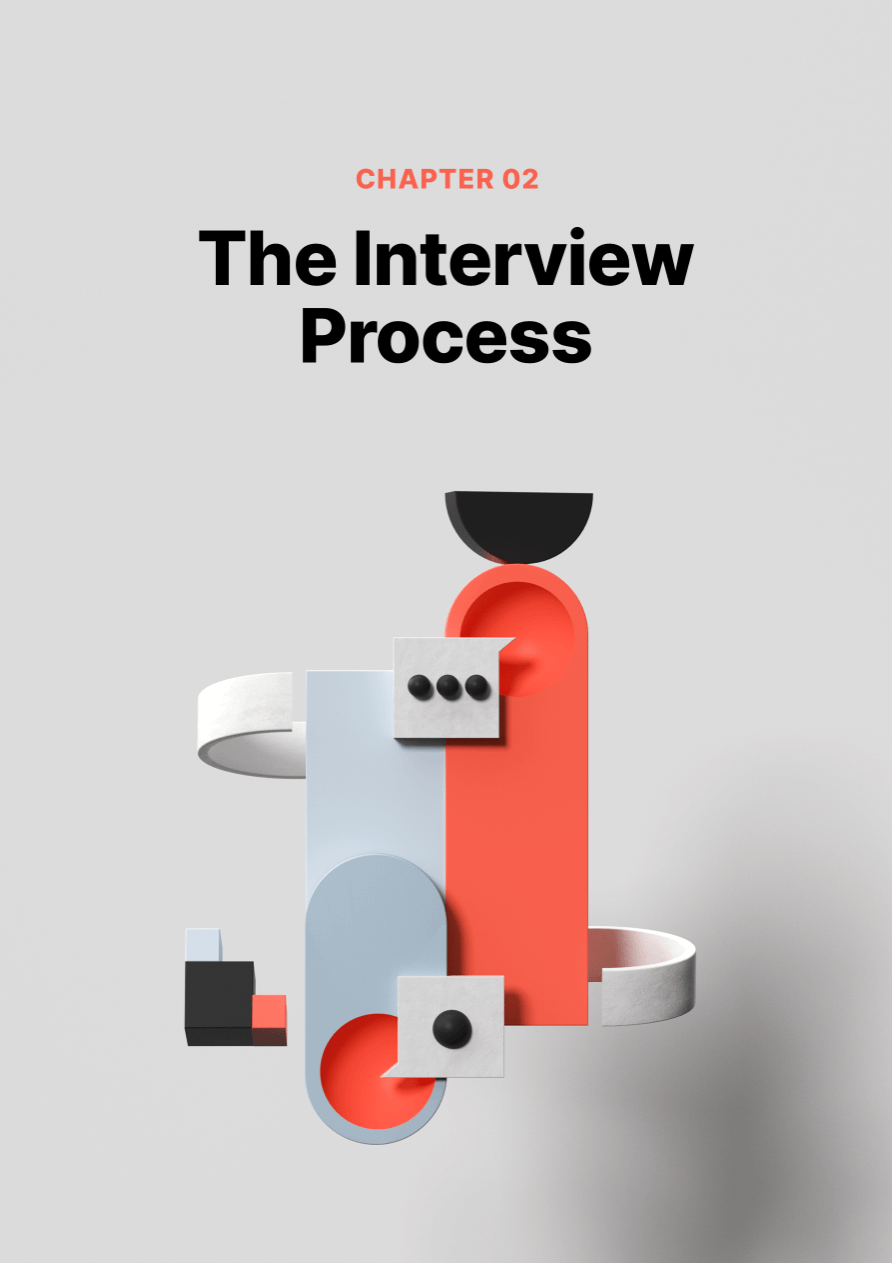
First of all, lets address the elephant in the room: the interview process is anxiety-inducing, exhausting, and stressful.
I struggle immensely with technical interviews and I know many of you do as well. Its okay if youre anxious or if you receive a rejection. Youre not alone.
The interview process will change from company to company but at the bare minimum you can expect a recruiter phone interview and a technical phone interview.
The interview process has several steps. Lets discuss each of these steps in-depth.
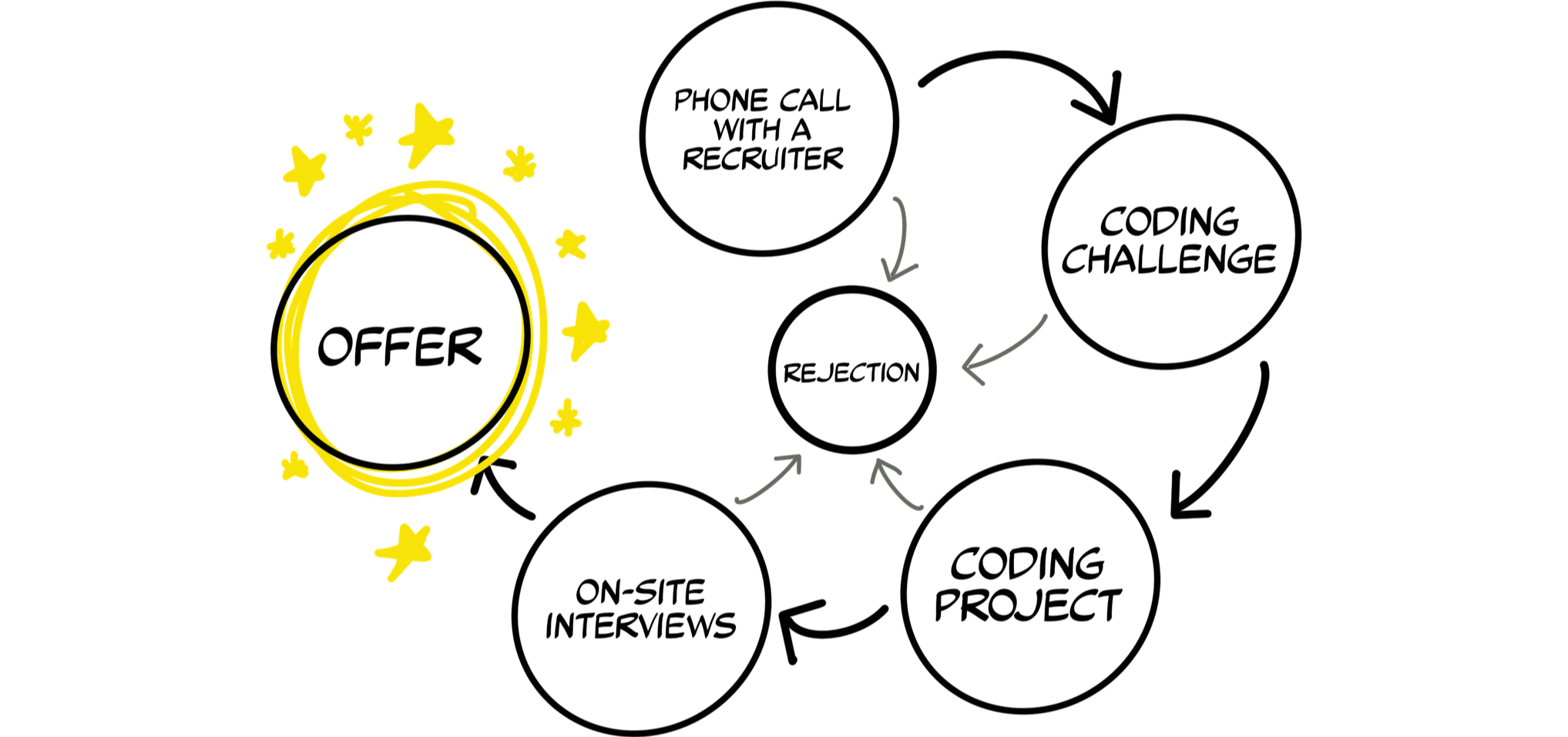
During the phone interview the recruiter will tell you a bit more about the role and the interview process. Dont take this interview lightly.
Each step in the interview process is important and counts towards your overall performance.
Here are some tips for the recruiter phone interview.
If youre applying for a job the recruiter will expect you to have a general understanding of the role youve applied for. So if youre mass-applying to every role you encounter, keep the applications organized.
When applying for multiple roles I like to create a Notion document with a table containing the company name, recruiter name and email address, a link to the application, and other pertinentdetails.
Before the recruiter phone interview, do some research on the company to see what their values are and what theyre currentlyworking on. Showing that youve done some investigation will impress your recruiter.
Did you know that every culture has a differentperception of time? I didnt either until I read The CultureMap by ErinMeyer. But regardless of whether or not its appropriate to join a meeting five minutes late in your home culture, you should always be on-time for a job interview.
If youre conducting your recruiter call through an online video meeting, join a few minutes early to sort out any technical issues that may arise.
If youre conducting the interview through a phone call, ensure your phone is not on do not disturb mode, and youre in a quiet place.
Towards the end of your meeting, the recruiter will askif you have any questions. Throughout the interview process, if an interviewer, recruiter, or hiring manager asks if you have any questions, say yes.
You should have one or two questions prepared that arerelevant to the role. They can include questions like:
- What is the culture like in the office?
- How is the diversity at your company?
- Are there opportunities for continuing education such as a conference allowance or subscriptions to learning platforms?
- How is the work/life balance?
Having questions prepared shows your interest in the role and may set you apart from other candidates.
Font size:
Interval:
Bookmark:
Similar books «De-Coding the Technical Interview Process»
Look at similar books to De-Coding the Technical Interview Process. We have selected literature similar in name and meaning in the hope of providing readers with more options to find new, interesting, not yet read works.
Discussion, reviews of the book De-Coding the Technical Interview Process and just readers' own opinions. Leave your comments, write what you think about the work, its meaning or the main characters. Specify what exactly you liked and what you didn't like, and why you think so.

